- Home
- Jane Arbor
Kingfisher Tide
Kingfisher Tide Read online
Kingfisher Tide by Jane Arbor
When Rose arranged to look after her aunt's small shop in a village in the South of France, she found it was necessary to get the permission of the seigneur Monsieur Saint-Guy before she could even trade — and he sounded like a belted earl. It was the beginning of an electrical relationship.
Printed in Canada
First published in 1965 by Mills & Boon Limited, 50 Grafton Way, Fitzroy Square, London, England.
@Jane Arbor 1965
Harlequin edition published September, 1965
All the characters In this book have no existence outside the imagination of the Author, and have no relation whatsoever to anyone bearing the same name or names. They are not even distantly inspired by any individual known or unknown to the Author, and all the incidents are pure invention.
The Harlequin trade mark, consisting of the word HARLEQUIN and the portrayal of a Harlequin, is registered in the United States Patent Office and in the Canada Trade Marks Office.
CHAPTER ONE
FROM where she sat Rose's view beyond Maitre Verrier's head was of rain dancing viciously on pavé, of a cafe's soaked sunblind on the point of tearing from its frame and of the same cafe's menu-billboard being blown flat on its face as she watched. Sylvie sat a yard away, ignoring the same view, and the atmosphere of the lawyer's dim room was the heavier for their shared dejection.
Maitre Verrier broke the silence, addressing Rose in French she understood well, Sylvie only imperfectly.
"If I may say so, Mademoiselle Drake," he advised, "before Madame Bonnard left for South Africa and certainly before you and your stepsister came out from England to the possible disappointment you may face now, you would have done better to ascertain the full details of your aunt's tenancy of La Boutique. Par exempla, I myself could have furnished you with them—"
Rose sighed, nodded agreement. "Yes, I know," she said briefly, acknowledging rashness, admitting folly, but baulking at explaining in cold blood the heady enchantment which had betrayed her into both.
For there, on a London January morning, had been she and Sylvie in the small flat they shared. Sylvie, still in slow convalescence after the car crash which had killed their respective step-parents—Rose's own father, Sylvie's own mother—and had left Sylvie
to long deep shock and a right leg on which she might limp indefinitely.
And there had been Rose, hooded and wrapped against the weather she must fight on her way to the City exporters' where she worked as secretary to the senior partner.
And there—prosaically by way of the mails, when they both felt it should have flown in on wings of promise—had arrived Rose's Tante Elise's letter, making Rose the offer which had brought them both to the anticlimax of today.
Then the letter had seemed to have all the answers.
A year in the warmth of the South of France to enable Sylvie to climb back to full health. . . . Twelve whole months of nostalgic delight for Rose, whose memory of the alien magic of France derived from just one childhood visit to Paris with her French mother. Mrs. Drake had died the following year; two years later, when Rose was fifteen and Sylvie thirteen, Rose's father had married Mrs. Lyon, Sylvie's widowed mother. After that, until last year's tragedy, the four of them had always holidayed in England, and there had been no more France for Rose until now.
The one thread which tied her to it was the occasional letter or greeting-card exchanged with her Aunt Elise, who kept a rented gift-shop here in Maurinaire, on the coast between Hyeres and St. Tropez. But after one short stay in England five years back, when Rose was in sick-quarantine at school and had not met her, Tante Elise had not come again, nor had Rose visited her—which made the more dramatic and welcome her suggestion that for the period of her own twelve-months' trip to South Africa to visit her
married daughter, Rose and Sylvie should manage and keep alive the goodwill of La Boutique on her behalf.
`It is not a fat business, you understand,' she wrote. `This and that in leather and pottery; at Easter, First Communion gifts for the children; at Jour de Pan, gifts for everyone; some costume jewellery, perfume, a few souvenirs for the summer tourists—no more than this, but it is a living for me and must be again when I return. In the meantime, through the generosity of my son-in-law, I can do without it, and if you, Rose chérie, can see your way to keeping it warm for me, you are only too welcome to all you can make from it.'
The letter had gone on to say that, whether or not Rose accepted, they could not meet; there was no time. Her aunt's passage was already booked for a few days ahead; in the hope that Rose would come, the key of the shop and the upstairs flat would be left with Maitre Verrier, Madame Bonnard's man of business. The flat would be aired, the shop well stocked—Rose and Sylvie would find Maurinaire entirely charming. Red rocks and pines to the water's edge, a sea the colour of a kingfisher's wing; just now, the mimosa a gold cloud against the blackcloth of the Maures massif—all unimaginable from their bleak England . . . After which lyrical flight the letter had ended with an airy 'Bonne chance!' which at the time they had both thought unnecessary, but were now thinking they might need all the good luck there was to be had.
Excitedly they had gone into ways and means. Sylvie had been employed in a Piccadilly handbag
shop before her accident, so she knew at least the leather-goods trade. She had been awarded some damages for her injury. They both had some savings. Since they would not be taking paid employment, French labour permits would not be necessary; the present currency allowance was generous. . . .
They could do it ! There had followed an urgent exchange of cables about details; a frustrating hiatus while Rose worked out her notice to her firm; then packing and an impromptu farewell party—and here they were, ready and eager to be charmed, but instead discouraged to their very bones by Maurinaire's empty streets, by wind, by rain, by cold, and most of all by the bombshell of Maitre Verrier's news.
Rose felt she must hear it again in all its bleak clarity.
"You really mean," she asked him, "that without my aunt's landlord's permission, we shan't be able to carry on her business for her while she is away ?"
Maitre Verrier bowed his head, set his fingertips together.
"That is so," he agreed. "And as I have said, why Madame Bonnard did not ask me to advise Monsieur Saint-Guy of her plans for you, this I cannot understand."
But Rose thought she could. From her aunt's letters she judged Tante Elise to be much as Rose's mother had described her.
"Elise, dear girl," Mrs. Drake had often said indulgently, "has always acted first and been wise later." So Tante Elise could have forgotten the terms of her lease or, remembering them, had hoped the problem would sort itself out. Rose could not believe
she had wantonly saddled them with the present deadlock. But here it was, all the same.
Rose asked next, "So how do we go about getting leave to take over the business? Who is this Monsieur Saint-Guy, and how do we get in touch with him ?"
"He is—" Maitre Verrier sought a word and chose `seigneur,' which Rose took to mean 'lord of the manor' as the lawyer went on, "He lives at the Château Saint-Guy above the town. He owns the cork-oak plantations of our foothills, the whole of the foreshore and most of Maurinaire itself, and all his business tenants are bound by the same conditions as Madame Bonnard."
"But he will give us permission to trade?" persisted Rose.
A shrug. "It is possible, mademoiselle, though by no means certain. In other cases he has been known to withhold a sub-tenancy without seeing fit to give his reasons."
Rose put out a reassuring hand to Sylvie, who was showing irritation at not understanding what was being said. Rose explained quickly, "It seems there's this landlord who is entitled to di
g in his heels on some manorial right of veto. But we'll get over it—" To Maitre Verrier she said, "Well, the sooner we ask Monsieur Saint-Guy, the better. Shall we do it, or will you do it on our behalf ? Meanwhile, since we must have a roof over our heads, I suppose at least we can have the key of La Boutique?"
"But certainly you can have the key." It was produced and handed over as Maitre Verrier went on, "It is, you understand, only your right to conduct the business which Monsieur Saint-Guy may withhold,
and for the moment I am afraid you must remain in doubt about that."
"Why?" asked Rose baldly.
"Because I happen to know he is at present away from home."
"But there must be someone— ! An agent who acts for him?"
Another shrug. "Bien entendu, he has a man of business. But by earlier precedents he insists on interviewing all sub-tenants in person, and I think you may have to wait until that is possible on his return."
"And when will that be ?"
"On that I have no information, mademoiselle."
Rose bit her lip. "I see, though I must say it all sounds rather—feudal." She turned again to Sylvie, interpreted briefly, but cut short the younger girl's dismayed protest by rising and saying,
"Well, there it is. Say we adjourn to the flat now and go into committee there on what to do next ?" She thanked Maitre Verrier, who called a junior from his outer office to carry their hand-luggage the short distance across the square, then bade them au revoir, promising his further help if they needed it, though Rose felt he was faintly relieved to see them go.
As they fought the wind in the wake of their escort Sylvie panted, "I can't think why he didn't tell your aunt she ought to warn us about all this."
Rose panted back, "I think he may have done, if she consulted him. But either she forgot about it or thought there'd be no difficulties put in our way. Because after all it's the goodwill of her business that will go to pot if we aren't allowed to carry it on, and she couldn't possibly have wanted that."
"Her goodwill ! What about our living? Running the shop was supposed to make the whole thing possible for us, and how are we to make ends meet if we aren't allowed to? And the place itself ! It looks as if it went to sleep last century and hadn't bothered to wake up yet. Kingfisher blue sea indeed ! Rose-red rocks ! The only mimosa on show looks like sodden cottonwool, and the weather— ! Oh, Rose, d'you know I've begun to wish we'd never come !" wailed Sylvie on a plaintively querulous note.
Fleetingly Rose's own prudence had wished the same, though not for worlds would she admit so at this stage. Particularly not to Sylvie who, since her accident, had lost resilience, needed bolstering at every turn. Rose's mother had had a word for such people. 'They lack life's oil upon their feathers and should have the help of those of us who have plenty and to spare,' she would say. And Rose, remembering, determined there should be 'oil' for Sylvie's disillusion now.
Aloud she said stoutly, "This weather won't last, and even the South of France has some winter, you know. The mimosa season is nearly over anyway, and as for the rest—well, we haven't actually been refused the shop yet, have we?"
"By some old stodge who isn't even on hand to give either his Yea or Nay—no, I suppose not," agreed Sylvie sourly as they reached their destination, Rose thanked the boy for his help and then used the key on the door.
Their entrance was by way of a corridor from which the bow-fronted shop opened off. There the blind was down, and Sylvie agreed dispiritedly that
before inspecting it, they should open up the flat, switch on some heat and make themselves a meal from the provisions they had bought after arriving at Hyeres on the night train from Paris.
The overhead flat consisted of a living-room over the shop, a bathroom, a tiny kitchen and a bedroom for each of them—the place about the size of their London quarters, but to their English eyes, rather sparsely furnished for comfort.
Looking about her in the living-room, Rose mused, "Somehow the French seem to get by with such unsympathetic chairs and so few tables." But her eye had happily noted the shutters to every window. For they spoke of sun and yet more sun to come—some time in the future of their year there would be heat that sizzled and shade which would be balm by contrast. And somehow, somehow, she and Sylvie must wait for it. They must !
Over the meal they made such plans as they could, and Rose promised to ask Maitre Verrier to contact Monsieur Saint-Guy's agent as soon as possible.
But there was another dampener awaiting them when they went to look at the shop. Granted Sylvie was seeing the worst of everything that day. But her sweeping verdict on the stock they found in drawers and fitments and unpacked parcels was that it was hideous, that she couldn't imagine who would buy it and that, if anyone did, it must surely be at a price which wouldn't pay for the wrapping paper and string.
Rose was moved to protest. "Maurinaire isn't the West End," she reminded Sylvie gently. "And if Tante Elise hadn't customers for the kind of stock she kept, she couldn't have lived on it as long as she has."
"Well, I wouldn't know how she managed it, and there are two of us," Sylvie pointed out.
"Well, perhaps this is all the stock Tante Elise needed to carry during the winter, and she would lay in a lot more and different stuff for the summer tourists," suggested Rose.
"But I thought the whole point of the South of France was its winter season ? Yet, so far, have you seen anyone at all who looked as if they might be in the market for a beachbag or a pair of sunglasses? Or the sort of hotel where they'd be likely to stay? Or anywhere they could eat, except that dreary joint next to the baker's, which also seemed to be shut in the middle of a weekday ?"
It was shrewd comment, and Rose privately admitted to her own misgivings at the lack of life around them. But still on the defensive for Maurinaire and her dreams, she said, "Nearly all French shops do shut for a couple of hours from noon onwards, and it's such a foul day, you'd hardly expect anyone to be about. Anyway, if—"
"—If we aren't allowed to do any trade it couldn't matter less, I suppose ?" put in Sylvie. But though that hadn't been Rose's thought at all, she let it drop there. Sylvie was overtired and their long journey and the long, bumpy bus-trip from Hyeres to Maurinaire, and was in no mood to discuss alternative plans which might well come to nothing. Besides, Rose needed time to look at them herself—a chance which was to be granted her soon after they had gone upstairs again.
For there Sylvie said she thought she could sleep if she lay down for a while. And no, of course she didn't mind being left if Rose wanted to explore a
little— So after seeing her cosily beneath her quilt and pleasantly drowsy from her prescribed sedative, Rose prepared to face the weather again, only to find that the bite had already gone from the vicious wind and that the rain-clouds were clearing minute by minute.
Now the air was almost gentle, and though the afternoon sun was low, it had enough strength to warm, and to dry out the pavé as she crossed it. Now the baker's and the other shops were open, and would be, she knew, until long after their counterparts had closed in England. There were people about. A curé in cassock and shovel hat. Children on their way home from school. Admittedly no one at all who looked like a wealthy winter visitor. Just French people, making concerted French noises, going about their affairs on a French afternoon— As Rose watched, all that was French in her was loving them. This was her mother's country and she, Rose, had come back to it. Within the pockets of her raincoat her fingers dug into her palms as she thought a prayer that she would be enabled to stay.
Certainly Maurinaire was far smaller than she had expected. She knew it had no railway station and was reached only by a long branch from the main coast road, but as Sylvie had guessed, it appeared to have no tourist hotel and very few residential villas. It perched—one could almost describe it as tilted—on its bluff above the sea; the ways out of its main square wound only downward and seaward or climbed towards the foothills and the towering mountains beyond.
Rose chose to take one of the latter roads, saving
up a walk to the sea until she could share it with Sylvie, who could better manage the gentle zigzag downward than a steep climb up into the hills. For Rose's affection for Sylvie had grown used by now to gearing most of her own actions and decisions to the consideration of how much Sylvie could manage or could not manage since her accident. Rose was the willing leaning-post; Sylvie the leaner. Fortunately they dovetailed in this just about as surely as they contrasted in other things. In their looks, for one—with Rose's coltish height, her dark hair with its hint of chestnut and the faint flush of her olive skin the complete foil for Sylvie's rose-petal fragility, her straw-fair hair and limpid blue eyes, which Rose had hated to see clouded by today's disillusionment.
After about half a kilometre the way she had chosen became a stony track bordered by olive trees, sweet chestnuts already fat-budded and occasional gnarled monsters which she took to be cork trees, though she had never seen the species before. Then gradually these increased at the expense of chestnut and olive, and at a point where she could catch a glimpse of the sea far below, a short way ahead the road came to a T-stop at a close-meshed wire fence enclosing a coppice only of cork oaks and extending right and left as far as she could see.
Off the road the undergrowth was thick as she skirted the fence for a short distance to the right, only to find that it dropped down into the next valley and climbed the next ridge and out of sight, enclosing no mere coppice but a forest.
Part of their landlord's estates? she wondered, though not for long when she reached another blind-
ending track, this time at a locked wire gate to which was affixed a notice-board—
Défense d'entrer sous peine d'amende.
Par ordre.
Saint-Guy.
Rose paused and read. So trespassers would be prosecuted, would they? Well, all right. But being in the mood to resent the man and all his works, she decided to be affronted by the style of the signature.

 High Master of Clere
High Master of Clere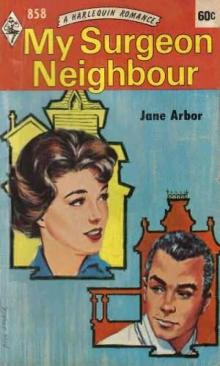 My Surgeon Neighbour
My Surgeon Neighbour Lake of Shadows
Lake of Shadows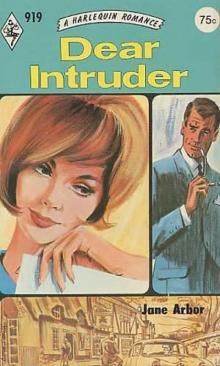 Dear Intruder
Dear Intruder Flash of Emerald
Flash of Emerald Return to Silbersee
Return to Silbersee Far Sanctuary
Far Sanctuary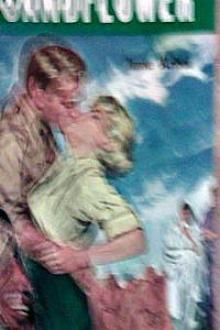 Sandflower
Sandflower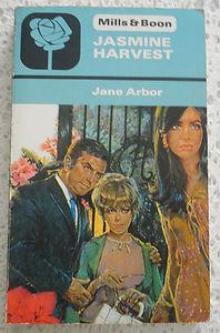 Jasmine Harvest
Jasmine Harvest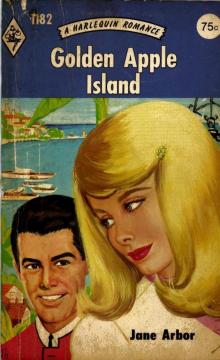 Golden Apple Island
Golden Apple Island Consulting Surgeon
Consulting Surgeon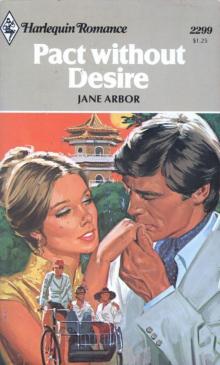 Pact without desire
Pact without desire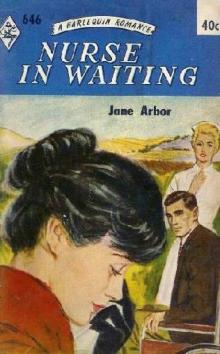 Nurse in Waiting
Nurse in Waiting Wildfire Quest
Wildfire Quest Roman Summer
Roman Summer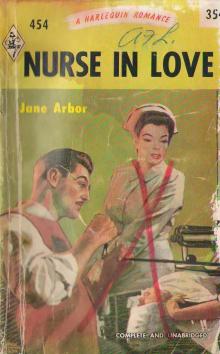 Nurse in Love
Nurse in Love Doctor's Love
Doctor's Love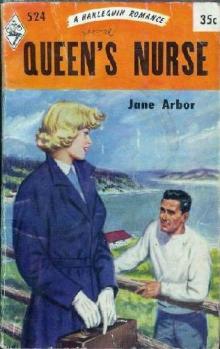 Queen's Nurse
Queen's Nurse Meet the Sun Halfway
Meet the Sun Halfway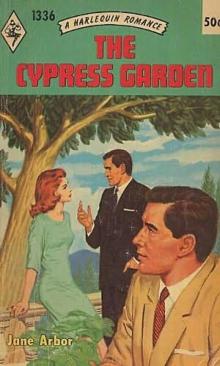 The Cypress Garden
The Cypress Garden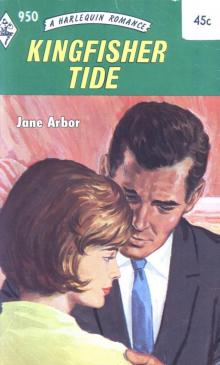 Kingfisher Tide
Kingfisher Tide A Growing Moon
A Growing Moon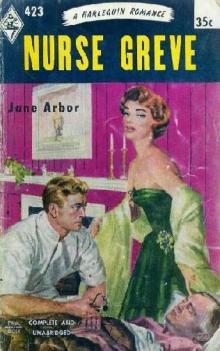 Nurse Greve
Nurse Greve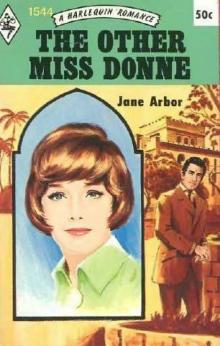 The Other Miss Donne
The Other Miss Donne